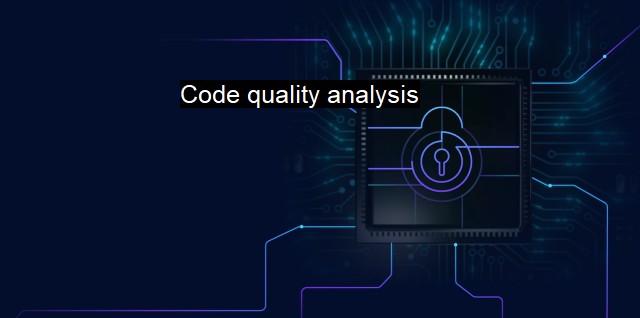What are Code quality analysis?
Enhancing Cybersecurity: The Vital Role of Code Quality Analysis in Antivirus Development
Code quality analysis refers to the process of analyzing and evaluating the code of software applications for various characteristics such as efficiency, reliability, maintainability, and security. The goal of code quality analysis is to identify potential issues and areas for improvement in the software codebase with an aim to improve the overall quality of the software.code quality analysis plays a crucial role in ensuring the security of the software application, and the systems and data it interacts with. The code of an antivirus solution must be secure, trustworthy, and robust to protect against potential threats such as malware, hacktivists, and cyber-criminals.
There are several reasons why code quality analysis is important in cybersecurity and antivirus development. First, code quality analysis helps to prevent software vulnerabilities that could be exploited by hackers. Code vulnerabilities such as buffer overflows and SQL injection attacks exist in many software applications, making them easy targets for cyber-attacks. By analyzing the code and identifying these vulnerabilities early on, developers can take appropriate measures to fix them and reduce the likelihood of unauthorized access to sensitive data.
Second, code quality analysis helps to improve the efficiency and performance of the software application. In antivirus software, efficiency is critical in order not to slow down the system or detrimentally impact user productivity. By analyzing the code, developers can identify areas where they can optimize or refactor the code to improve efficiency and better serve the user's needs.
Third, code quality analysis is also important for software maintainability and scalability. In the case of antivirus software, it is important to maintain the software to keep up with the evolving threats landscape. This includes adding new features, fixing bugs, and improving existing functionality. Code quality analysis helps to ensure that the software can easily be maintained and scaled to meet the needs of users.
software code quality analysis involves using several techniques and tools to assess and evaluate the software codebase. One of the most popular code quality analysis techniques for cybersecurity is static analysis. Static analysis tools scan the codebase, analyze it, and generate a report highlighting any potential issues. This helps ensure that the software is more secure, performant, and maintainable. Static analysis tools go beyond just code quality metrics and evaluate items like code signature which helps prevent malware and unauthorized code execution.
Other code quality analysis techniques that could be employed in the cybersecurity context include dynamic analysis and behavioral analysis. Dynamic analysis enables software to be tested while in runtime solving the challenges related to code changes. Behavioral analysis tests the software application using various testing scenarios and verifies that it performs as expected.
Code Quality Analysis is very important for cybersecurity and antivirus solution development. It plays a significant role in ensuring that the code is secure, efficient, and easy to maintain and scale. Developers and others in the cybersecurity industry use sophisticated tools and techniques to evaluate software quality, taking a holistic approach to cybersecurity. Code quality analysis is ongoing, and as new threats continue to emerge, it will be critical for software applications’ efforts to maintain trust, adoption, and effective security performance.

Code quality analysis FAQs
What is code quality analysis?
Code quality analysis is a software development process that involves assessing the code's overall quality, security, and maintainability. It helps identify vulnerabilities, errors, and bugs in the code to ensure its reliability, safety, and efficiency.Why is code quality analysis important in cybersecurity and antivirus?
Code quality analysis is critical in cybersecurity and antivirus because it helps identify potential security weaknesses and vulnerabilities in the code. It ensures that the software is secure, reliable, and free from vulnerabilities that can be exploited by hackers and other malicious actors.What tools are used for code quality analysis in cybersecurity and antivirus?
There are various tools used for code quality analysis in cybersecurity and antivirus, such as static code analysis tools, dynamic code analysis tools, and software composition analysis tools. These tools help developers identify flaws in the codebase and ensure that the software meets the necessary security requirements.How often should code quality analysis be conducted in cybersecurity and antivirus?
Code quality analysis should be conducted regularly, ideally after each code change or update. This ensures that any vulnerabilities or errors are identified and addressed as soon as possible, reducing the risk of security breaches or other issues. In addition, regular code quality analysis helps ensure that the software remains secure and reliable over time.| | A | | | B | | | C | | | D | | | E | | | F | | | G | | | H | | | I | | | J | | | K | | | L | | | M | |
| | N | | | O | | | P | | | Q | | | R | | | S | | | T | | | U | | | V | | | W | | | X | | | Y | | | Z | |
| | 1 | | | 2 | | | 3 | | | 4 | | | 7 | | | 8 | | |||||||